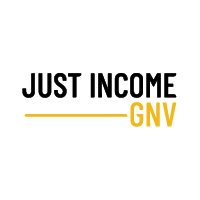
WHY we’re doing this
“NOBODY IN OUR COMMUNITY SHOULD BE TOO POOR TO BE FREE.”
— Kevin Scott, Just Income Director
Just Income is designed and administered by formerly incarcerated people. We know from our own experience that poverty can lead to incarceration and incarceration can lead to poverty. We believe a temporary guaranteed income could stop this revolving door. We see that a guaranteed income can mitigate known barriers to successful reentry and unlock the inherent potential of our justice-impacted neighbors.

Why is this a research study?
Evidence from guaranteed income projects all over the country (most notably in Stockton, California) shows us that when people have an income floor, they invest in themselves. Rigorous research shows that employment, housing security, financial stability, and mental and physical well-being improve because of a guaranteed income. Just Income takes this idea a step further and applies it to people who have been impacted by the justice system. Our pilot year was hugely impactful.
Using quantitative and qualitative data, we are continuing to study the relationship between income and recidivism, employment, housing, food security, well-being, and the criminalization of poverty.
Why is this important?
The US has the highest incarceration rate in the world. We spend about $182 billion a year locking people up. We boast 25% of the planet’s prisoners. Amazingly, Florida’s incarceration rate is even higher. Nearly two out of every hundred Floridian adults are incarcerated or under correctional supervision.
People coming out of the prison system are often already in debt. Serving time is expensive for the people inside and their families on the outside. Once released, they often encounter additional struggles finding employment and paying the fines and fees associated with probation. Locally, 23% of probation violations are because of a lack of money. This inability to pay can result in re-incarceration. People are, in essence, too poor to be free.
On average, it costs $28,000 per year to incarcerate someone in a Florida prison. Just Income, by comparison, invests an unconditional $7,600 over twelve months directly to one of our valued neighbors. This reflects a much more efficient and effective use of community resources and massive potential savings for taxpayers. By supporting our justice-impacted neighbors, the entire community benefits.

“I had to choose between eating and having a place to stay for the month, or paying my fees so I didn’t violate.”
- a former Florida prisoner
Cost on the inside
Prison is expensive for people on the inside and their families on the outside.
The food in prison is notoriously poor in quality and low in nutritional value. To supplement nutrition, the only option is the prison commissary, which is typically unhealthy and can cost up to seven times more than regular stores. Female and male prisoners alike either pay gouged prices or suffer from hunger. Even local jails charge people awaiting trial for transportation costs, linens, medical care, and even a daily subsistence fee, or “jail rent.” This economic burden falls on people who can least afford it.
Phone calls, mail, and visits carry costs. The basic desire to communicate and feel connected is monetized. Annually, families spend almost $3 billion just on phone calls and food for their incarcerated loved ones. Two out of three families of incarcerated people struggle to meet just their basic needs.
The cost of prison disproportionately affects people of color and impoverished communities. Prison doesn’t just break an individual - it breaks families and communities.

“I don’t know what was scarier - going into prison or coming out.”
— Just Income recipient
Cost on the outside
After release, there’s no “income floor,” just a deep financial hole. Former prisoners face 27% unemployment, a rate higher than The Great Depression. They struggle to find work despite staying in jobs longer and saving employers money. Without legitimate work options, some are forced to seek alternative sources of income, paradoxically risking their freedom to stay free.
Despite diminished opportunities, justice-impacted people face enormous demands for money and stability. They are ordered to pay fines and fees for probation, mandatory classes, court costs, electronic monitoring, polygraphs, and drug tests - to name a few. Locally, over 20% of probation violations are because of a lack of money. An inability to pay fines and fees can result in reincarceration - effectively criminalizing poverty. We spend billions of dollars a year re-incarcerating people for just technical violations.
Stable housing is crucial to thriving. Former prisoners, however, face homelessness at a rate ten times that of the general public. This rate rises after each contact with the justice system. Nearly one in five families face eviction, are denied housing, or do not qualify for public housing once their loved one comes home.
“Soul murder” is a term that’s been coined to describe the lasting effects of incarceration. Former prisoners often internalize a deeply negative sense of personal identity. Post-Incarceration Syndrome can manifest as depression, anxiety, institutionalization, hopelessness, suicide, and more. Physical and mental health outcomes are worse for both individuals and their families. The prison doesn’t end at the wall - it keeps on going.




